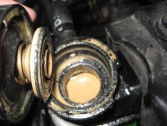
QMotor Mobile App
Find it on the App Store.


Tires are one of the most important parts of the car, as they are responsible for moving and operating the car efficiently.
The tires are filled with compressed air, which in turn helps the wheel to carry the weight of the car. Therefore, car owners should use suitable tire pressure for tires to operate efficiently as well as reduce fuel consumption. According to experts, tire pressure should be checked regularly, preferably in the early morning before being affected by the heat of the sun.
Read more: 5 Tire Maintenance Tips That Can Save You Money
Hence the question of which is better to use Nitrogen or normal air to fill tires and maintain a proper air pressure inside them.
Is Nitrogen better than Oxygen for tires?
For a long time, tires have been filled with normal air “Oxygen”. With the continuous development in technology, tires can be filled with another gas, Nitrogen. So, what are the benefits of using Nitrogen in tires?
1. Extend tires lifespan
Using Nitrogen for tires helps to prolong its lifespan Unlike normal air, oxygen reacts with tire rubber and rapidly destroys or explodes tires, especially in summer and high temperature.
2. Low cost
Nitrogen remains inside the tires for longer time than normal air. Therefore, if you use normal air, you will not know how many times you will refill tires with air. On the other hand, Nitrogen lasts for a longer time so you don’t need to refill tires every week, for example.
3. Prevent rust
Rust is caused by humidity and air, and tires filled with Oxygen which will cause a rusty metal frame especially with high temperature. while the use of Nitrogen does not cause rust because it is dry and does not contain Oxygen.
4- Egg balloon
Nitrogen works to protect tires and reduce the occurrence of a "balloon", a side bulge of the tire caused by the collision of tires with bumps. This will damage the tire and you should replace it.
Further reading: Could You Fill Tires with Water Instead of Air?
5. Pressure stability
As the Nitrogen molecules are larger than the oxygen molecules, they are not allowed to go out through the rubber particles, thus keeping the air pressure constant in tires.
6. Reduce fuel consumption
As mentioned earlier, Oxygen affects tire pressure because it is affected by temperature and thus increases the fuel consumption of the vehicle. In contrast, Nitrogen maintains tire pressure and thus reduce fuel consumption and prolong tires lifespan.
7. Facilitate movement
Nitrogen, thanks to its movement inside the frame, helps to smooth and ease the movement of the vehicle.
8. Safer
Nitrogen is known to be non-flammable, unlike Oxygen, making it safer in case of accidents and reduces the possibility of a vehicle exploding or flammable. Nitrogen is usually used to fill racing tires around the world as well as commercial airlines.
Read more: Do I need new tires?
Sell your used car or buy a car in Qmotor.

The Q Motor team has included some valuable tips for you which will help you pass your driving...

The engine is the most important part of the car at all, and it includes
.jpg)
Names are a large and wide world with many meanings. Our awareness of the things around us...

This guide contains a definition of traffic violations, traffic points system, classification of...
Comments